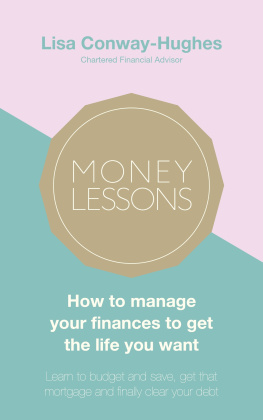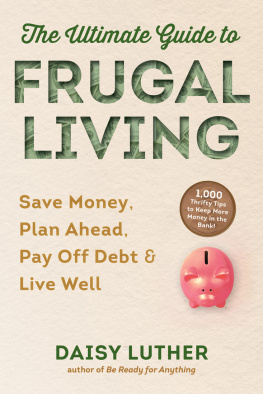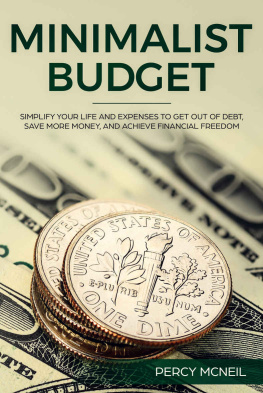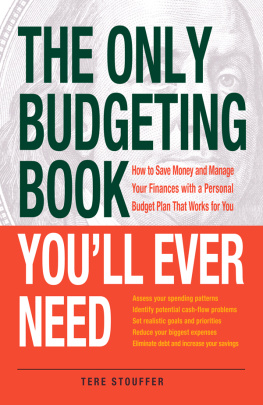Lisa Conway-Hughes
MONEY LESSONS
How to Manage Your Finances to Get the Life You Want

PENGUIN LIFE
UK | USA | Canada | Ireland | Australia
India | New Zealand | South Africa
Penguin Life is part of the Penguin Random House group of companies whose addresses can be found at global.penguinrandomhouse.com.

First published 2019
Copyright Lisa Conway-Hughes, 2019
The moral right of the author has been asserted
ISBN: 978-0-241-37936-3
This ebook is copyright material and must not be copied, reproduced, transferred, distributed, leased, licensed or publicly performed or used in any way except as specifically permitted in writing by the publishers, as allowed under the terms and conditions under which it was purchased or as strictly permitted by applicable copyright law. Any unauthorized distribution or use of this text may be a direct infringement of the authors and publishers rights and those responsible may be liable in law accordingly.
I dedicate this book to my children Jago & Kiki xx

Whats the Point of Being Financially Savvy?
We can always find excuses not to make positive financial choices. Life tempts us with one-click shopping, a taxi is only a few taps away and our lives are so hectic that popping out to buy lunch over taking a packed lunch has become the norm. In addition, life seems to continually give us signals that money is a taboo subject. British society teaches us that it is bad to talk about money at home, in the workplace and even with our closest friends. Its also acceptable (even funny) to admit that you are bad at maths. Maths and money are so often filed in the same mental compartment that it then somehow also feels okay to be bad with money. Added to all this is the fact that the financial industry is notorious for using mind-boggling jargon and making things complicated, so that when it comes to our money we often find ourselves making choices that actually leave us worse off than before.
The purpose behind this book is to help you take your first steps towards being financially in control. The short-term consequences of good money habits are rewarding and hopefully liberating. However, the long-term impact of financial savviness is life-changing. Its the difference between living a life where you use money to achieve the things that are important to you that make you happy rather than money dictating the type of life that you lead.
If you look up savvy in the dictionary it is described as:
Shrewd and knowledgeable; having common sense and good judgement
When it comes to money, no matter your age, the majority of people wouldnt count themselves as being financially savvy. In fact, most people make financial decisions on a day-to-day basis as questions about spending present themselves, and stick their head in the sand when it comes to thinking about longer-term finances. However, if you stop for just a moment and ask your brain to think about money, what are the questions that pop into your mind? Perhaps they go something like this:
Will I ever be out of debt?
How am I ever going to buy a house?
Will I ever be able to retire?
Am I stuck in this job for ever?
If these questions leave you feeling stressed, or with a feeling of dread in your stomach, you arent alone. For many people, money worries are the last thing that they think about at night. So how do we get from being financially scared to financially savvy?
For me, the definition of being financially savvy is having freedom from money worries. Not just living hand to mouth, being in debt and having very little in the way of savings. Its the freedom that comes with having the knowledge and confidence to make sound financial decisions that can help you to build (over time) your dream life. Its feeling comfortable talking, thinking and doing when it comes to money, having confidence in your own abilities to manage your finances. This is good financial wellbeing.
When I have the discussion with my clients about their financial wellbeing, very often they havent given it a thought.
The reason why is because it is not something that we are used to doing. School and sometimes family background teaches us to get our head down and work hard regardless of whether were heading towards the destination we actually want. How many people take the first graduate job going on a meagre salary, only to realize ten years later that they are in an industry that doesnt interest them and their income hasnt grown the way they thought? How many have followed the financial choices and career paths that would please their parents but not them? How many dont know their own worth when it comes to the money they should be earning? If you dont know your own worth and the value of your time (after all, we only have a finite amount of it), how will you build the life that you deserve? If you are wasting the money you earn on unnecessary things or even indulging in the excesses of modern life, will you ever keep up with yourself? Not just financially (debt is very draining) but also in your career: will you become trapped in a job you hate because of the salary?
The need to assign time to focus on self-care and personal development has become a given. How does the time you spend on taking care of yourself compare with the time you spend on your financial wellbeing? When so much of our mental wellbeing is tied up with our money, should we all be doing more? If you spent an hour a month nurturing your finances for the next twelve months, how would you feel this time next year? What would be different?
This book is your opportunity to take a step back and spend some time mapping out the future you want, identifying what will make you happy and how your finances can enable you to do this. This point is really important as most people look at it the other way round. Their finances dictate their life and their happiness which to me just doesnt make sense. Money should be the tool that you use to achieve your dreams not the thing that holds you back from reaching them.
As time goes by, your aims in life and the things that are important to you will change, and so too will your financial plan, so its important to make sure you enjoy the process along the way!
Setting Financial Goals
Setting long-term goals when it comes to money is scary in itself, especially if you havent done anything like it before. The key to good goal-setting is to chunk it into realistic and obtainable mini goals if you are initially struggling to think big. This will help the goal to instantly feel more achievable and will help you to meet this goal in the short term. Remember: just because a goal has been set, it doesnt mean that it is set in stone. Goals need to be flexible so that as your life changes and your priorities change over time, you can also adapt your goals.
For example, when I was in my late twenties I presumed that by my mid-thirties I would be feeling grown-up and that moving out of London would be important to me. Now that I am in my late thirties, I realize that staying in London is actually very important to me and so I have had to change my goals about the type of home I wanted to buy accordingly.
The first thing when it comes to setting goals is













